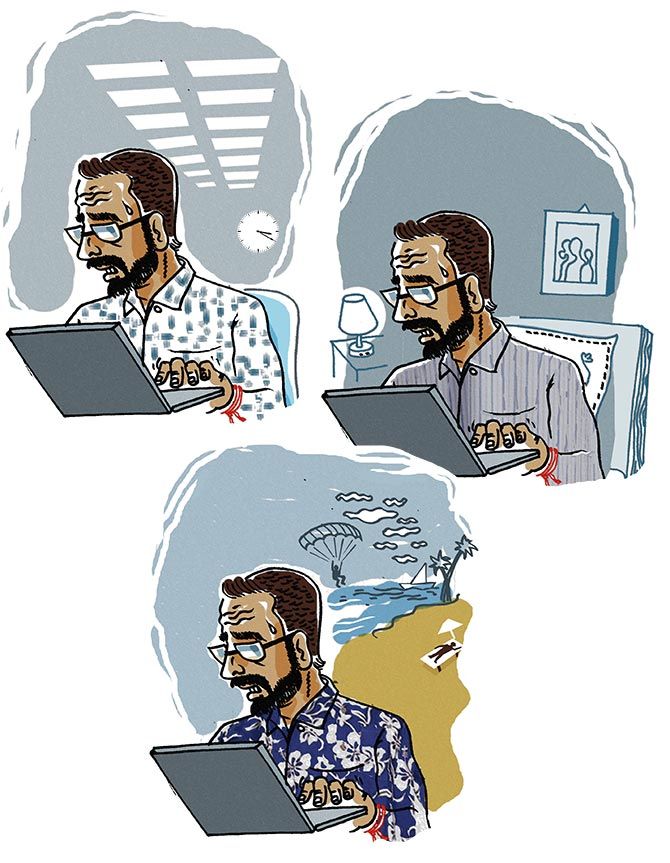 | « Back to article | Print this article |
Repeated surveys have shown that India is among the world's top vacation-deprived countries. Kanika Datta reflects on our work-life balance — the lack thereof that is.
Illustration: Dominic Xavier/Rediff.com

Work-life balance -- or the lack thereof -- is the Next Big Thing in corporate culture, right up there with gender equality. Achieving it is, apparently, such a complex business these days that it demands the services of professionally trained specialists called Life Coaches, with prescriptions demanding all manner of exercises and interventions to instruct executives in the serious business of relaxation. Indians, at least the more affluent ones, could find a simpler solution by going on holiday.
This conclusion can be drawn from a discouragingly titled Vacation Deprivation Survey by online travel company Expedia. The survey, which polled over 9,000 people in 26 countries, shows that India is among the world's top-five vacation-deprived countries.
It would be easy to ascribe this to the contrasting attitudes of Europe and North America versus Asia. In the West, vacations are considered a right (even heads of government go on holiday); in Asia, they are considered an inconvenience. No surprise, four of the top five vacation-deprived nations were from this continent.
For India, a more granular view of the survey doesn't improve the picture greatly. Fully 40 per cent of Indians say they don't use up their vacation days because their work schedules do not allow for it or they don't have enough staff to cover for them. This suggests that either Indian employees are so paranoid as to consider themselves indispensable or the organisations for which they work are extremely inefficient.
Taken together with other data, it is hard to escape the view that it is corporate India, one engine of "emerging Asia", that is fostering a culture of workaholism.
Two years ago, for instance, another travel site, TripAdvisor, reported that half of Indians surveyed carry their work with them on vacation, six percentage points more than their counterparts in the West. In other words, even those who do go on leave spend at least a part of their time working.
The dividing line between workaholism and hard work is a fine one, but it exists. World-wide, hyper-competition and technology are the most common explanations for the 24X7 work impulse worldwide.
Left to themselves, however, Indians could well be categorised as hard workers rather than wilful addicts of the workplace, if Expedia's findings are to be believed. Asked whether they would choose a pay raise over a vacation, the survey report noted that "India was the only country whose residents said they would choose more vacation over more money, with 54 per cent choosing time off and 46 per cent choosing a raise."
Globally, only 15 per cent of the respondents said they would prefer a vacation to a pay rise.
Since Expedia is a travel-related company with a vested interest in encouraging people to go on holiday, it is possible for HR departments to dismiss these findings as trivial. It is not that managements are unaware of the problem of induced workaholism. But their "work culture" concerns tend to be focused on how they think employees should be coping rather than what employees really want. Thus, the palliatives remain firmly within the ambit of the workplace. Weekly official parties, off-sites of the "What-happens-in-Vegas" variety, "family days" (when spouses and children get the privilege of observing you in the workplace), lavish rewards for high performance are all techniques in vogue to encourage employees to never switch off.
And increasingly, in case employees have missed the message in all of this hectic office-related social activity, the corner offices in Indian corporations send out subliminal signals on the art of making yourself indispensable. Whether in promoter-driven firms or professionally managed ones with wide shareholding structures, the man (and it is mostly men) at the top find it uniquely difficult to extricate themselves from the workplace. Larsen & Toubro and ITC are two standout examples of long-playing chairmen, but consider the family-owned conglomerates that dominate Indian business and it's the same story.
On a longer view of history, the Indian executive's predilection for being vacation-shy marks an interesting change; if any institution holds the patent for workaholism as a concept, it is the American corporation. Indians and Chinese, once considered "lazy", are replacing the US as the torchbearers of the trend.
In terms of work culture, it may not be the healthiest of trends, but that may be something president-elect Donald Trump will want to think about as he vows to bring back jobs to his country.